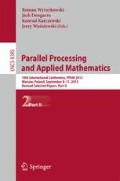Abstract
The efforts of the research community and the software industry to make the art of parallel programming easier continue. Measuring the usability of contemporary parallel programming languages and libraries by empirical studies is the key to understanding how programmers are thinking, designing, coding, and debugging parallel programs. In this paper we take apart into their component ingredients the empirical experiments done in the recent years. By analyzing each component separately we can better understand what is missing in these experiments and thereby improve the outcome of future studies. The result of this work is a set of recommendations that aims to make usability studies more convincing so that parallel language designers will take them seriously.
Access this chapter
Tax calculation will be finalised at checkout
Purchases are for personal use only
References
Nielsen, J. http://www.useit.com/alertbox/20030825.html
Cave, V., Budimlic, Z., Sarkar, V.: Comparing the usability of library vs. language approaches to task parallelism. In: Proceedings of the Evaluation and Usability of Programming Languages and Tools, PLATEAU ’10, 18 October 2010, Reno, NV, USA (2010)
Sadowski, C., Shewmaker, A.: The last mile: parallel programming and usability. In: FoSER 2010, 7–8 November 2010, Santa Fe, New Mexico, USA (2010)
Szafron, D., Schaeffer, J., Edmonton, A.: An experiment to measure the usability of parallel programming systems. Concurr. Pract. Exp. 8(2), 147–166 (1996)
Luff, M.: Empirically investigating parallel programming paradigms: a null result. In: Workshop on Evaluation and Usability of Programming Languages and Tools (PLATEAU) (2009)
Ebcioglu, K., Sarkar, V., El-Ghazawi, T., Urbanic, J., Center, P.S.: An experiment in measuring the productivity of three parallel programming languages. In: Workshop on Productivity and Performance in High-End Computing (PPHEC) (2006)
Wilson, G.V., Bal, H.E.: An empirical assessment of the usability of Orca using the Cowichan problems. IEEE Parallel Distrib. Technol. 4(3), 36–44 (1996)
Anvik, J., Schaeffer, J., Tan, K.: Why not use a pattern-based parallel programming system? In: Kosch, H., Böszörményi, L., Hellwagner, H. (eds.) Euro-Par 2003. LNCS, vol. 2790, pp. 81–86. Springer, Heidelberg (2003)
Nanz, S., Torshizi, F., Pedroni, M., Meyer, B.: Design of an empirical study for comparing the usability of concurrent programming languages. In: International Symposium on Empirical Software Engineering and Measurement. pp. 325–334 (2011)
Okur, S., Dig, D.: How do developers use parallel libraries? In: FSE (2012)
Nanz, S., Torshizi, F., Pedroni, M., Meyer, B.: Empirical assessment of languages for teaching concurrency: methodology and application. In: Proceedings of the CSEE&T’11, pp. 477–481. IEEE Computer Society (2011)
Nanz, S., Torshizi, F., Pedroni, M., Meyer, B.: A comparative study of the usability of two object-oriented concurrent programming languages. http://arxiv.org/abs/1011.6047 (2010)
Hochstein, L., Carver, J., Shull, F., Asgari, S., Basili, V.: Parallel programmer productivity: a case study of novice parallel programmers. In: Proceedings of the SC’05, p. 35. IEEE (2005)
Hochstein, L., Basili, V.R., Vishkin, U., Gilbert, J.: A pilot study to compare programming effort for two parallel programming models. J. Syst. Softw. 81(11), 1920–1930 (2008)
Cantonnet, F., Yao, Y., Zahran, M., El-Ghazawi, T.: Productivity analysis of the UPC language. In: Proceedings of the IPDPS’04 (2004)
Rossbach, C.J., Hofmann, O.S., Witchel, E.: Is transactional programming actually easier? In: Proceedings of the PPoPP’10, pp. 47–56. ACM (2010)
GitHub. https://github.com
CodePlex Open Source Project Hosting. http://codeplex.com
Halverson, C.A., Carver, J.: Climbing the plateau: getting from study design to data that means something. In: Workshop on Evaluation and Usability of Programming Languages and Tools (PLATEAU) (2009)
Author information
Authors and Affiliations
Corresponding author
Editor information
Editors and Affiliations
Rights and permissions
Copyright information
© 2014 Springer-Verlag Berlin Heidelberg
About this paper
Cite this paper
Marowka, A. (2014). Towards Standardization of Measuring the Usability of Parallel Languages. In: Wyrzykowski, R., Dongarra, J., Karczewski, K., Waśniewski, J. (eds) Parallel Processing and Applied Mathematics. PPAM 2013. Lecture Notes in Computer Science(), vol 8385. Springer, Berlin, Heidelberg. https://doi.org/10.1007/978-3-642-55195-6_6
Download citation
DOI: https://doi.org/10.1007/978-3-642-55195-6_6
Published:
Publisher Name: Springer, Berlin, Heidelberg
Print ISBN: 978-3-642-55194-9
Online ISBN: 978-3-642-55195-6
eBook Packages: Computer ScienceComputer Science (R0)

